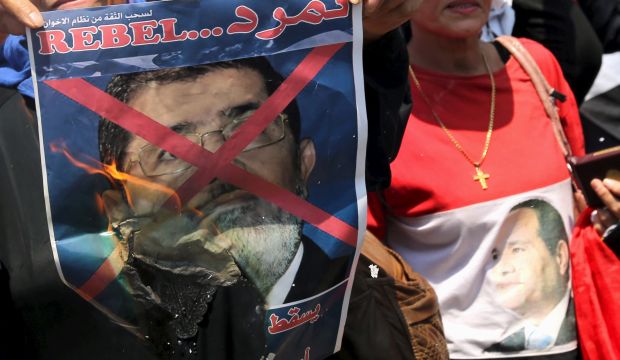In August 2013 Egypt was in a state of alert: supporters of the Muslim Brotherhood were protesting at Rabaa Al-Adawiya Square in Cairo and at Al-Nahda Square in Giza while the rest of the Egyptians were deeply angered by the Islamist group and its violent methods. At the time, Adly Mansour was Egypt’s interim President and his government was struggling to restore stability to Egypt as it faced a surge of Islamist-inspired violence and criticism from several western countries who claimed that toppling the Brotherhood amounted to a coup.
Amid this heated atmosphere, the Egyptian street was split between a remarkable majority, who sharply opposed the Brotherhood and wanted to see their rallies dispersed at any cost, and a pro-Brotherhood minority, who feared they lost their second chance of ruling Egypt, given that their first one came in 1954 when they failed to assassinate President Gamal Abdel Nasser.
Cairo was swarming with Western delegations who visited Egypt in an attempt to reach a political settlement between the military-backed government and the ousted Brotherhood on the grounds that it was still possible to involve the Islamist group in the country’s political process if they accepted the political roadmap. Egyptian officials at the time said they would not mind welcoming the Brotherhood if it renounced violence.
The Egyptians were not happy with foreign delegations arriving at the presidential Heliopolis Palace to mediate between the interim government and the Brotherhood. In fact, the smartly dressed members of those delegations could not feel what Egyptians in cafes and homes really felt. People in Egypt were pessimistic about the presence of those delegations and wanted them to leave the country. For the Egyptian people, what was happening in Egypt was a domestic crisis and they wanted their government to remain strong in the face of outside pressures.
Qatari Foreign Minister Khalid Al-Attiyah has recently announced his readiness to mediate between the government and the Brotherhood, saying the Islamist group is one of Egypt’s political components. In fact, one cannot but question the timing of the Qatari offer which came just after Egypt celebrated the inauguration of its new Suez Canal, an achievement which has been the subject of a childish propaganda campaign by the Brotherhood supporters who mocked it as insignificant.
There is no chance for mediation or dialogue between the government and the Brotherhood. No future government will accept that as it will face fierce opposition from the public. It would be illogical to bring up the issue now that Egypt has proved it is on the right track towards stability and development.
If they have a genuine desire to ensure greater stability in the region, those who sponsor the Brotherhood should realize that the Islamist group has lost everything and therefore needs to change politically and ideologically if it wants to have a place in the future of Egypt.
